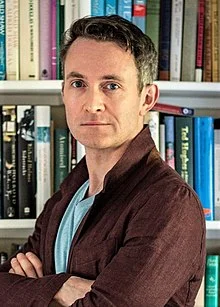
Douglas Murray
Douglas Murray is a prominent British author, journalist, and political commentator. Born on July 16, 1979, in London, Murray has established himself as a leading voice on various socio-political issues. He graduated from Magdalen College, Oxford, with a degree in Modern History. Murray's writing career took off with the publication of his first book, "Bosie: A Biography of Lord Alfred Douglas," which explored the life of Oscar Wilde's lover. He later gained widespread recognition for his thought-provoking works, including "The Strange Death of Europe" and "The Madness of Crowds," which critically analyze the impact of immigration and identity politics on Western societies. Murray's insightful commentary has made him a sought-after speaker and commentator, frequently appearing on television and radio programs. With his articulate and often controversial viewpoints, Douglas Murray continues to shape public discourse and challenge prevailing narratives.
Books Mentioned on The Joe Rogan Experience (JRE) #1807 – Douglas Murray
Exploring the Human Need for Belief Systems: Insights from Joe Rogan Experience #1807 with Douglas Murray
In episode #1807 of the Joe Rogan Experience, host Joe Rogan and guest Douglas Murray delve into the intricate relationship between human identity and belief systems. The conversation, which spans a variety of topics, offers insightful perspectives on how personal experiences and societal constructs shape our understanding of the world.
The Impact of Religious Upbringing on Personal Belief
The podcast begins with an anecdote about a woman who, after leaving her Mormon upbringing, finds herself susceptible to other belief systems, including cult-like self-help groups. This story underscores a key theme of the episode: the impact of religious upbringing on an individual’s ability to discern and engage with different ideologies. Murray and Rogan discuss how being conditioned to accept certain beliefs without question can lead to a vulnerability towards other, potentially nonsensical or harmful, ideologies.
The Quest for Meaning in a Post-Religious Society
A significant portion of the conversation focuses on the human search for meaning in the absence of traditional religious structures. Murray posits that even as society moves away from organized religion, the inherent human instinct to seek purpose and belief remains strong. He suggests that this search often manifests in the adoption of alternative ideologies, which may not be religions per se but serve a similar purpose in providing a framework for understanding the world.
The Phenomenon of ‘Atheism Plus’ and Its Implications
The dialogue touches upon the concept of ‘Atheism Plus,’ a movement that sought to combine atheism with a moral framework encompassing values like anti-discrimination and anti-sexism. Murray and Rogan critique this approach, arguing that while the intent might be noble, the fusion of atheism with an ideological framework can lead to its own set of dogmas and problems, echoing the pitfalls of organized religion.
The Role of Leaders and Figures of Authority in Belief Systems
Another intriguing aspect of their discussion is the human tendency to seek out leaders or god-like figures who provide a set of rules and a moral compass. This tendency, according to Rogan and Murray, is a fundamental aspect of being a ‘tribal primate.’ They reflect on the potential for charismatic individuals to establish powerful cults or belief systems, especially in an era where traditional religious beliefs are in decline.
The Ongoing Human Search for Meaning and Belief
The Joe Rogan Experience #1807 with Douglas Murray offers a profound exploration of the human condition, particularly our need for belief systems and meaning. The conversation not only delves into the complexities of religious and post-religious societies but also highlights the universal human quest for purpose and understanding in an ever-evolving world.
Redefining Luck in Personal and Societal Contexts
In the second segment of the Joe Rogan Experience #1807, host Joe Rogan and guest Douglas Murray engage in a thought-provoking discussion about the concept of luck. They explore how luck is often perceived and the underlying factors that contribute to what people commonly attribute to chance.
The Misinterpretation of Luck in Personal Achievement
Murray highlights the common tendency to attribute success to luck, which can undermine the hard work and effort put into achieving goals. He emphasizes that while being in the right place at the right time does play a role, it’s often the result of hard work and thoughtful decisions. This redefinition of luck challenges the notion that success is merely a stroke of fortune, instead suggesting that it’s often the outcome of design and effort.
Luck as a Result of Predecessor’s Choices
An intriguing aspect of their discussion revolves around the idea that what we consider luck might actually be the outcome of the decisions and efforts of those before us. For instance, the liberties and opportunities present in a country like the United States are not merely luck but the result of prudent decisions made by past generations. This perspective shifts the focus from luck to responsibility and the impact of collective actions over time.
The Influence of Luck on National Fortunes
Extending the conversation to a global scale, Murray and Rogan examine how the concept of luck applies to countries. They argue that the fortunes of nations are not merely a matter of luck but are significantly influenced by the decisions made by their leaders. The contrast between Norway and Venezuela, despite having similar natural resources, serves as a case study in how governance and policy decisions can lead to vastly different outcomes.
Conclusion: Rethinking the Role of Luck in Life and Society
The second third of Joe Rogan Experience #1807 with Douglas Murray offers a profound reexamination of the role of luck in both personal success and the fate of nations. The conversation encourages listeners to look beyond the superficial understanding of luck and consider the deeper, often overlooked factors that shape our lives and the world.













